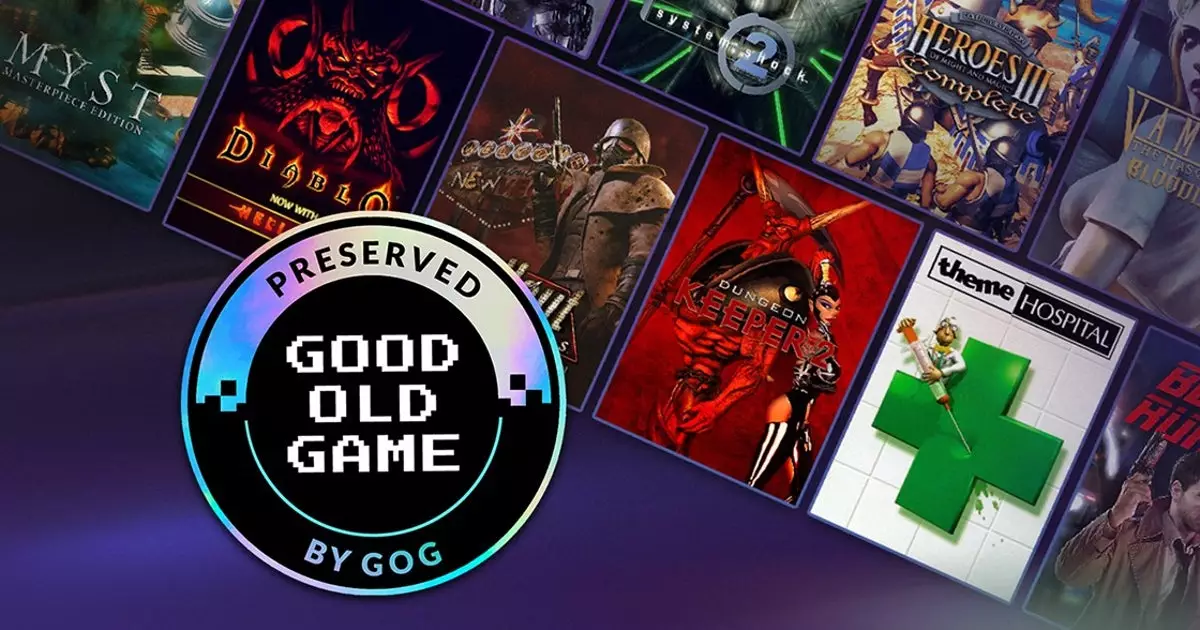In a landscape dominated by modern gaming, GOG has historically carved a niche for itself as a guardian of classic titles. However, as the digital storefront has expanded its catalog to include contemporary blockbusters, it has faced scrutiny for its shift away from pure game preservation. The platform, once revered for fostering nostalgic experiences through digital access to vintage games, has now adopted a model more akin to that of a conventional gaming marketplace, resembling a “dustier, DRM-less Steam.” Nevertheless, GOG’s recent announcement to emphasize game restoration signals a promising return to its roots.
At the heart of this endeavor lies the GOG Preservation Program, an initiative aimed at revamping older titles to ensure their compatibility with modern systems. This program builds upon GOG’s previous efforts to breathe new life into classic games, such as the updates provided for titles like Alpha Protocol and the Resident Evil trilogy. The strategic move mirrors Valve’s Steam Deck Verified system, presenting users with a clear understanding of which games are optimized for newer hardware.
The Restoration Process: A Technical Revamp
GOG’s in-house development team has embarked on a considerable technical overhaul of these classics. This revitalization includes iron-clad bug fixes and the incorporation of essential features that many contemporary players may take for granted, such as updated video codecs and compatibility with Windows 10 and 11. By implementing these changes, GOG intends to ensure that its offerings not only evoke nostalgia but also perform seamlessly on current technology.
Once a game has successfully met the criteria for this restoration process, it earns the distinguished “Good Old Game” badge. This emblem serves as a clear indicator for consumers that the title has been refined for a modern gaming experience, alleviating concerns about potential compatibility issues often associated with older software. Apart from performance enhancements, these games promise to provide the most complete available versions, featuring all downloadable content, expansions, and even valuable resources like manuals and alternative language options. Furthermore, each title comes devoid of DRM, a notable selling point for players who champion digital ownership.
The program’s launch features a robust roster of over 100 revitalized classics, including the likes of Resident Evil (1, 2, and 3), the original Diablo with its Hellfire expansion, and cult favorites like Vampire: The Masquerade – Bloodlines and System Shock 2. While many enthusiasts revel in the chance to revisit these titles, others, including myself, find the potential for renewed focus on more recent classics, such as Fallout: New Vegas, to be an equal draw. The need to mod these more modern titles for compatibility can grow frustrating, particularly in an age where seamless gaming experiences are expected.
Despite the enthusiastic tone of the Preservation Program, GOG acknowledges the complexities associated with reviving older games. In many cases, the original developers and publishers must grant authorization for restoration endeavors. This prerequisite can complicate the restoration process, as many studios might hesitate to relinquish full control over their intellectual property, especially when financial considerations come into play.
Nonetheless, GOG’s shift toward a preservation-centric approach is undoubtedly a step in the right direction. With tangible benefits for gamers—such as offline compatibility and the avoidance of reliance on often unstable community mods—this initiative shines a light on the conversation surrounding game preservation as a whole. It underscores the dire need for a viable strategy that allows developers and publishers to profit while simultaneously maintaining access to legacy titles. This intersection of commerce and preservation represents a delicate balancing act, yet it ultimately fosters a healthier gaming environment.
GOG’s ambitious plans to revitalize gaming’s heritage come at a critical juncture, particularly as consumers increasingly express frustration over the fragility of digital game ownership. Lawsuits against publishers for withdrawing access to games via server shutdowns have underscored the pressing need for platforms to prioritize gamers’ rights and access to the titles they love. GOG’s renewed commitment to preservation may not only serve to cater to nostalgic impulses but might also act as a beacon for responsible stewardship of gaming history.
If GOG can maintain its momentum and navigate the hurdles inherent in this undertaking, it stands poised to make a lasting impact on the preservation of gaming culture. With the inclusion of modern classics and dedication to enhancing legacy titles for new generations of players, GOG may very well reaffirm its position as a champion for not just gaming history but also for the future of game accessibility.


Leave a Reply
You must be logged in to post a comment.